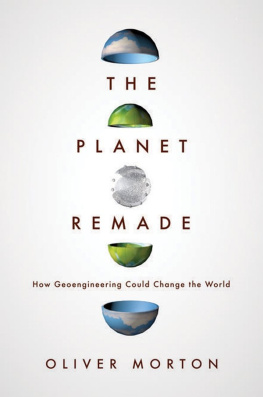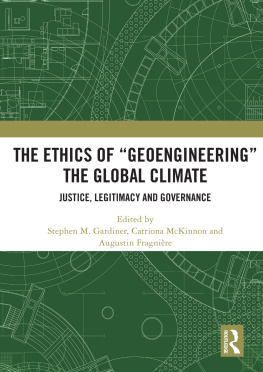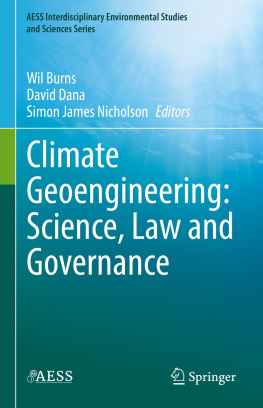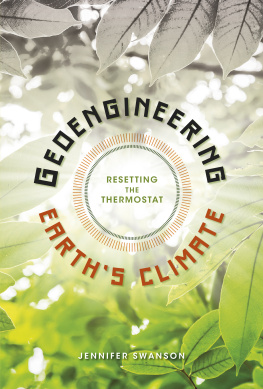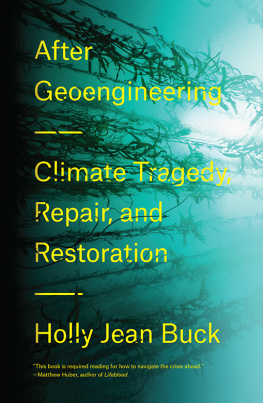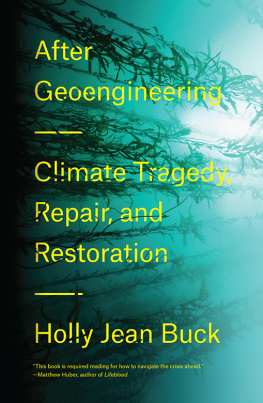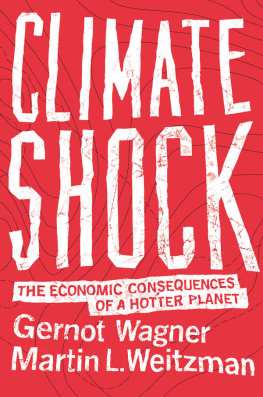More Praise for The Planet Remade
One of the most important and provocative books Ive read in years. The Planet Remade is essential for policymakers, environmentalists, skeptics, and anyone else who prefers their views on climate change to be based on evidence rather than rhetoric.
Hari Kunzru, author of Gods without Men
Oliver Morton displays here again the usual virtues of his writing, which include a sparkling clarity maintained even when conveying huge complex masses of information, often about topics new to all of us; and then, even more importantly, good judgment. He makes distinctions when evaluating gnarly problems, and explains the distinctions very persuasively, and with a generous dry wit. All these abilities are now devoted to perhaps the crucial question of our time, the climate, making this simply a Necessary Book, which is also a pleasure to read. Maybe that combination makes it sui generis, but in any case its an important addition to current discourse, an excellent way to get oriented to our most pressing environmental problem, and I urge people to read it and ponder its news.
Kim Stanley Robinson, author of Red Mars and Aurora
This is the first book to properly consider the dimensions of the new world we are living in. Mortons book is indispensable, highly readable, and incredibly timely.
Mark Lynas, author of The God Species
Written with the grace and clarity its subject demands, The Planet Remade offers just what the issue of climate change needs: fresh thinking about what can be done, based on deep respect for the planet, the science, and the concerns of people with differing points of view. Its an enriching addition to the literature of possible worlds.
Marek Kohn, author of A Reason for Everything and Turned Out Nice
Engaging, persuasive, and thought provoking. Morton discusses the potential role and consequences of geoengineering and puts forward his own carefully considered views on the subject. The Planet Remade is a tour de force of wide-ranging scholarship as well as a soundly argued polemic.
John Shepherd, University of Southampton
Morton accessibly describes the potential and risks of geoengineering and puts them in the context of climate change and other large-scale interventions that humans have had on the earth system or might seek to have in the future.
Tim Kruger, University of Oxford
THE PLANET REMADE
Oliver Morton

The Planet Remade
How Geoengineering Could Change the World
PRINCETON UNIVERSITY PRESS
Princeton and Oxford
Published in the United States and Canada in 2016 by Princeton University Press, 41 William Street, Princeton, New Jersey 08540 press.princeton.edu
First published in Great Britain by Granta Books, 2015
Copyright ABQ72 Ltd, 2015
Extract from The Love Song of J. Alfred Prufrock taken from Collected Poems Estate of T.S. Eliot and reprinted by permission of Faber and Faber Ltd.
Democracy Words and Music by Leonard Cohen 1992, Reproduced by permission of Sony/ATV Songs LLC/Sony/ATV Music Publishing UK Ltd, London W1F 9LD
Handlebars Words and Music by Andrew Guerrero, Jamie Laurie, Jesse Walker, Kenneth Ortiz, Mackenzie Roberts and Stephen Brackett 2008, Reproduced by permission of Flobots Music Publishing/Sony/ATV Sounds LLC/Sony/ATV Music Publishing UK Ltd, London W1F 9LD
The right of Oliver Morton to be identified as the author of this work has been asserted by him in accordance with the Copyright, Designs and Patents Act 1988
All rights reserved. This book is copyright material and must not be copied, reproduced, transferred, distributed, leased, licensed or publicly performed or used in any way except as specifically permitted in writing by the publisher, as allowed under the terms and conditions under which it was purchased or as strictly permitted by applicable copyright law. Any unauthorized distribution or use of this text may be a direct infringement of the authors and publishers rights, and those responsible may be liable in law accordingly.
Library of Congress Control Number 2015946728
ISBN 978-0-691-14825-0
Typeset by Avon DataSet, Bidford on Avon, Warwickshire
Printed on recycled paper
Printed in the United States of America
1 3 5 7 9 10 8 6 4 2
For Joe Morton,
Dominic Harrison,
Eva Herle Schaffer
and Jack Bacon
My millennials
Contents
Introduction
Two Questions
Let us go then, you and I,
When the evening is spread out against the sky
Like a patient etherized upon a table
T. S. Eliot The Love Song of
J. Alfred Prufrock (1915)
In March of 2012, in a large-windowed conference hall on the snowy campus of the University of Calgary, I heard two simple questions. The man asking them was trying to help his audience get the most out of their day by giving them a clear understanding of where they, and others, stood when it came to action on climate change. To that end he asked them:
Do you believe the risks of climate change merit serious action aimed at lessening them?
Do you think that reducing an industrial economys carbondioxide emissions to near zero is very hard?
Although this book is about more than climate change, it is because of the challenges of climate change that I have written it. And the two questions which were posed that morning by Robert Socolow, a physicist from Princeton University, seem to me a particularly good way of defining your position on the subject. So take a moment to answer them, if you would. The books not going anywhere without you, and I think it will be a better read if you position yourself with respect to those questions before getting stuck in.
Heres a bit of context.
There is no serious doubt that the atmospheres greenhouse effect is a key determinant of the Earths temperature. Nor is there any serious doubt that carbon dioxide is a greenhouse gas, or that humans have been adding to the level of carbon dioxide in the atmosphere for the past few centuries by burning fossil fuels. In 1750, before the industrial revolution, the carbon-dioxide level was 280 parts per million. In 1950, when the great global boom of the second half of the twentieth century was taking off, it was about 310 parts per million. Today it is 400 parts per million. The bulk of that change has been due to the burning of fossil fuels. If you disbelieve any of those statements, you have been misled. I am not going to take the time to try and disabuse you in this book, and you should read on in expectation of frustration.
There is, however, a lot of room for doubt about the level of climate change the planet will see over the next decades and centuries. The best current estimate is that if fossil-fuel use continues on anything like current trends, the Earth is likely to end up at least two degrees Celsius warmer than it was before the industrial revolution, and possibly quite a lot warmer still. Change by one degree or two over a century or so may sound minimal, but it would be unprecedented in human history. Models of what happens to the climate in worlds in which fossil-fuel use is unconstrained point to severe, even cataclysmic, consequences in the form of damage to agriculture, greater harm done by extreme weather, the loss of biodiversity and sea-level rise over timescales of decades to centuries.
That said, different models provide different possible climates at any given carbon-dioxide level some are more sensitive to the gas than others, in the language of modellers and it is possible that the models on which warnings about climate change have mostly been based are, for some reason, skewed towards an unrealistically high sensitivity. It is also possible that humans and their natural world will be able to adapt to changed climates more easily and cheaply, and with less suffering, than most people concerned about climate change now believe. Thus it is possible that, even though carbon dioxide is unarguably a greenhouse gas, and a lot of it is being added to the atmosphere, climate change due to human action will not in the end be a planet-changingly big deal.
Next page
